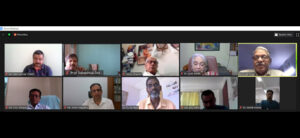National Workshop on Climate Change and Cities: Urban Climate Vulnerability Assessment Framework
The event was inaugurated by Shri Durga Shanker Mishra, IAS, Secretary, MoHUA and attended by 200 plus officials from government policymakers, development practitioners from municipal corporations, research institutes and experts across..
National Workshop on “Climate Change and Cities: Urban Climate Vulnerability Assessment Framework” was organised by Integrated Research & Action for Development, a reputed public policy think tank based in New Delhi, India.

The event was inaugurated by Shri Durga Shanker Mishra, IAS, Secretary, MoHUA and attended by 200 plus officials from government policymakers, development practitioners from municipal corporations, research institutes and experts across the country as well as diverse stakeholders, including think tanks, civil society, the private sector, bilateral and multilateral agencies internationally, regionally, and nationally.
Prof. Jyoti K Parikh, Executive Director, IRADe gave the welcome address citing the climate challenges faced by Indian cities. She briefed about work of IRADe as Centre ofExcellence, Ministry of Housing & Urban Affairs, Govt. of India. She highlighted that Adaptation and Mitigation to climate risks in cities is an essential aspect of the Indian government’s efforts to fulfil its commitment to the United Nations Framework Convention on Climate Change (UNFCCC).
Shri Mishra, IAS, Secretary, MoHUA, GOI Government of India lauded the efforts taken by IRADe to organize this important workshop which involved municipal commissioners from various cities. Mr Mishra, pointed out that we must be sensitive to the environment to avoid disastrous consequences. He stressed on historical data which show how climate change destroyed civilizations. He added that cities are like laboratories for evaluating the impact of urbanization and challenges from climate change. Development cannot happen without inclusiveness, resilience, and without moving away from Business As Usual Scenario. Cities have been impacted more by COVID-19, and this UVAF (Urban Vulnerability Assessment Framework) is critical for cities adaptation measures in the future.”
Dr. Sudhir Krishna, Former Secretary, Ministry of Housing & Urban Affairs. GOI moderated the session on Urban Vulnerability Assessment Framework and stressed upon the importance of climate resilient cities. He also emphasised on the need for development plan of urban agglomerations and not just the city municipal limits.
Mr Rohit Magotra, Deputy Director IRADe briefed that Urban Climate Vulnerability Assessment Framework (UVAF) designed and developed by IRADe with an aim to make Indian cities climate resilient uses seven broad thematic indicators – physical, hazard, social, demographic, financial provisioning, infrastructure and administration vulnerabilities, and their sub indicators to evaluate the climate vulnerability in Indian cities. Secondary information sources available at city level were used for assessing climate vulnerability of the cities.
Prof Ajit Tyagi, Senior Advisor, IRADe informed that the framework will enable the Indian government to identify high risk cities through a comprehensive predictive qualitative framework, whilst also acting as a vulnerability monitoring tool. It will help identify and target climate vulnerable regions, sectors or populations, raise awareness, monitor implemented strategies and periodically indicate the state of climate vulnerability of Indian cities.
High level delegates include Dr G.N.Qasba, Former Commissioner, Srinagar Municipal Corporation, & Senior Advisor, IRADe, Shri B. S. Sohliya, I.A.S, Chief Executive Officer, Shillong Municipal Board, Shillong, Prof. Anil K Gupta, Professor, National Institute of Disaster Management (NIDM) and representatives from national and international development agencies.
The UVAF tool can act as a critical tool in India’s development of climate resilience and disaster risk reduction in cities, through identifying existing vulnerabilities and there by working strategies developing climate resilient cities and evolve e adaptation plans. The UVAF implementation will meet the Government of India’s dual objectives of Climate Change Adaptation (CCA) and Disaster Risk Reduction (DRR).
For more details please get in touch with Ms Nimisha Jha, Senior Research Analyst, IRADe. (email –njha@irage.org, Mob. 9810393663)

